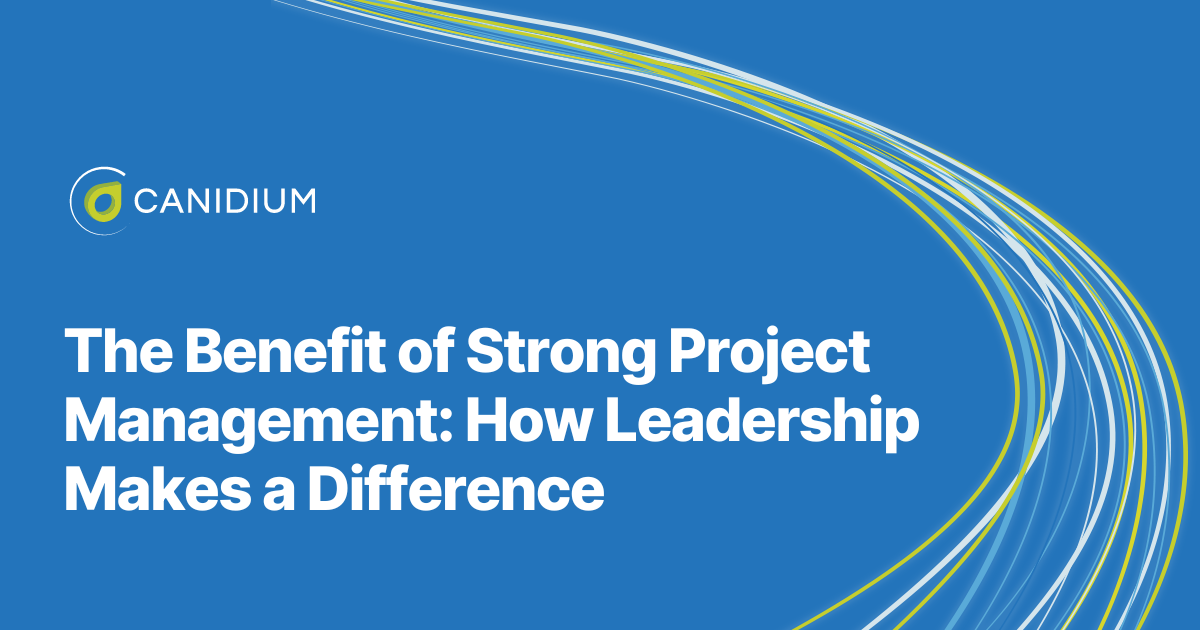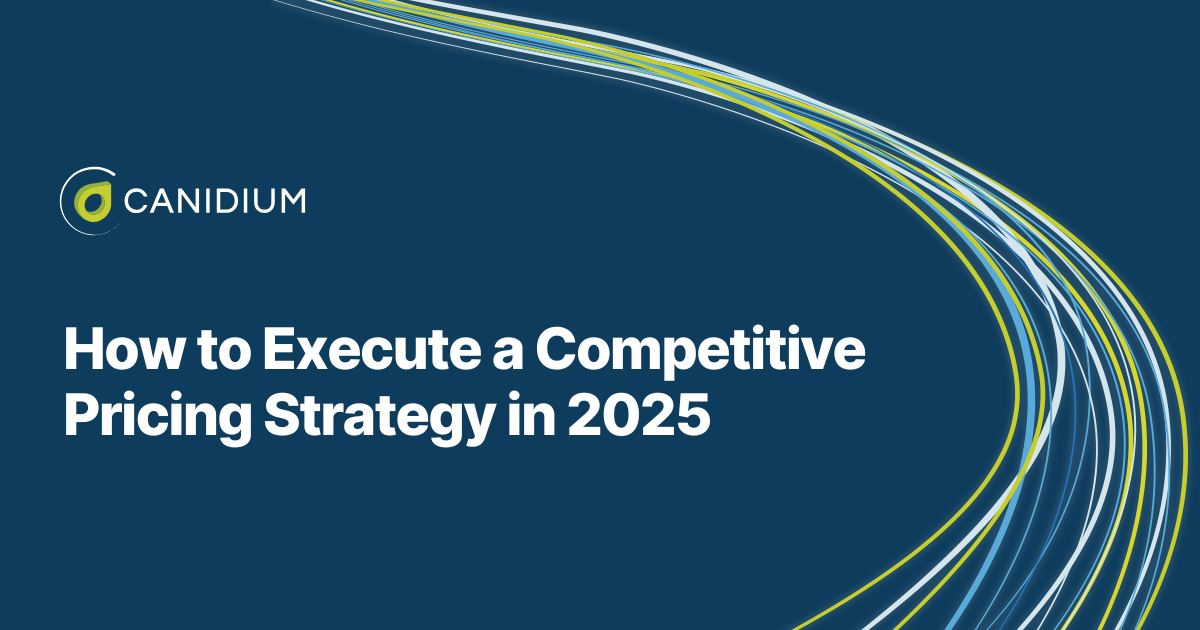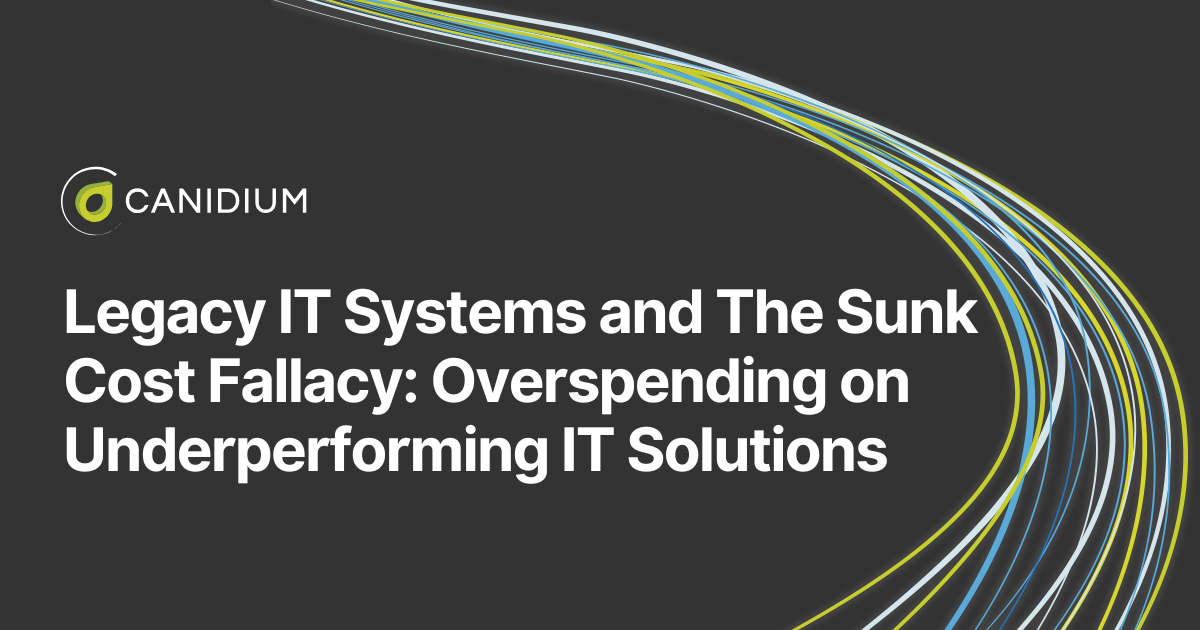If your organization is embarking on a digital transformation project, you are probably investing considerable resources in software implementation. The returns from these projects can significantly improve your operational efficiency. However, how do you make sure that the value of every dollar you invest is put to good use? How do you ensure your investments are not wasted in poorly executed digital transformation project management?
At Canidium, our teams of software solution experts design, implement, and manage complex software implementation projects. We have extensive experience with project management, both the benefits of strong leadership and the consequences of its absence.
This article covers the six benefits of project management that you should consider when assembling your internal processes and priorities.
6 Benefits of Strong Project Management That Move the Needle
The stark contrast in outcomes with and without effective project management is clear—65% of projects fail to meet all of their stated goals successfully. However, this figure drops dramatically to around 20% when a project management process is implemented. The benefits of project management are evident within the data. Without an effective manager, your project is more likely to fail and less likely to net its maximum potential ROI. Yet, these statistics do not tell the whole story.
To truly understand what a good project manager brings to the table, you need to understand the individual benefits you will see when you have strong leadership at the helm. Moreover, you also need to know the potential problems you will face without an effective project manager.
Here are six transformative benefits of project management and the problems you may encounter without an effective leader in the role:
.png?width=1920&height=1080&name=Heading%20(13).png)
1. The Benefit of Project Management Leadership
There is a 40% difference in project success rates between organizations where leadership makes decisions in less than 1 hour instead of those that take up to 5—the quality of leadership matters. Project success is driven by the management level, where critical choices are made, priorities are set, and resources are managed.
A good project manager steers your team through the process, avoiding unforeseen obstacles and coordinating your crew's activities. They are the glue that holds the team together, seeing to the high-level progress of the project and facilitating communication between stakeholders. Without a good project manager, your project may be rudderless, without a clear step-by-step outline to follow, and left to meander while slowly consuming your resources.
Good Project Leadership Scenario:
Imagine an organization in the midst of implementing a new software solution. Midway through the project, it became clear that the existing customer data was incompatible with the new system, risking significant delays and potential data loss. In this scenario, a skilled project manager will swiftly coordinate actions to address these challenges. To facilitate rapid decision-making sessions, the project manager brings IT specialists, data analysts, and key stakeholders together to outline a solution.
These subject matter experts can then implement an interim data transformation strategy that allows the smooth integration of existing customer data into the new system. At the same time, an experienced project manager can also enhance communication by setting up a daily briefing with all teams involved to track progress and address issues promptly.
These strategic moves, underpinned by effective leadership, could prevent a disaster. The benefit of the project manager's leadership is that the timeline remains on track and within budget even in the face of challenges.
Poor Project Leadership Scenario:
Alternatively, a company facing this exact scenario without a dedicated project manager may not fare as well. You might not identify the issue of incompatible customer data until much later in the implementation process—or know how to marshal the resources within your organization to resolve the issue. This lack of visibility could lead to delays as the problem would only become apparent during later testing phases. By that time, you have already invested significant resources. Simultaneously, the reaction to the data compatibility issue might be disorganized. Different teams may address the problem in isolation, leading to inconsistent solutions and further complications. The lack of a centralized decision-making authority would exacerbate this disorganization.
Ineffective handling of the integration issue could result in escalating costs. You might need additional resources to rectify the data compatibility issue, including the potential rework of system parts initially thought to be complete. The longer it takes to resolve these issues, the more costly the project becomes. Stakeholders may grow dissatisfied, scope creep could inflate strained resources, and the project may fail.
2. The Benefit of Project Management Scheduling
On paper, sticking to a schedule seems simple. However, the reality of complex software implementation projects is much more challenging to manage. Even simple matters, such as determining that the project is over can be complicated. In fact, 77% of stakeholders report disagreement on when a project is complete—potentially leading to scope creep and continued rework.
The initial project schedule is rarely set in stone. Unforeseen requirements, emerging issues, or change requests are almost inevitable and can significantly disrupt the planned timeline. The impact of these disruptions isn't isolated; it often cascades through the entire project, affecting various interconnected tasks and milestones. This is where the role of a project manager becomes indispensable.
A competent project manager doesn't just create the initial schedule but actively manages it throughout the project's lifecycle. They are responsible for coordinating all changes, ensuring that each adjustment is reflected accurately in the timeline and communicated effectively to all stakeholders. This proactive management helps mitigate the ripple effects of scheduling conflicts and keeps the project aligned with its objectives. Additionally, by maintaining a flexible yet controlled approach to project scheduling, a project manager can minimize the risk of scope creep and ensure that the project adheres to its defined boundaries, ultimately leading to a more structured and predictable project outcome. This level of scheduling discipline is essential not only for meeting deadlines but also for maintaining budget control and achieving the desired project results.
3. The Advantage of Improved Resource Planning
Resource planning in project management is a critical task that requires balancing the "Iron Triangle" of scope, budget, and time. This concept underscores the interconnectedness of these three elements and highlights that changes to one can inevitably affect the others. Effective resource management ensures a project's scope is within the allocated budget and timeline.
In any project, the scope defines what will be accomplished, the budget delineates the costs, and the time specifies the schedule. Effectively managing these elements can be likened to walking a tightrope, where each step must be balanced to avoid missteps. For instance, extending the project scope without adjusting the budget and timeline can lead to overworked teams and diminished quality, whereas reducing the budget without altering the scope or schedule may result in incomplete work or the need to cut essential features.
A proficient project manager navigates these challenges by meticulously planning and continuously monitoring all project resources, including human resources, materials, technology, and financial capital. Through continuous resource utilization monitoring against the project plan, project managers offer the benefit of identifying potential bottlenecks or shortfalls early. They adjust resource allocation promptly to address these issues, which helps maintain the project schedule and budget.
4. Better Project Management Communication
According to the research, 57% of projects fail due to a communication breakdown. Poor communication can lead to misaligned goals and expectations, causing discrepancies in project execution and outputs and resulting in stakeholder dissatisfaction. It also increases the likelihood of errors and the need for rework, driving up costs and extending project timelines. Additionally, ineffective communication can diminish team morale and engagement, lowering productivity and commitment to the project objectives.
To combat these issues, project managers deploy several strategic approaches. They create detailed communication and project governance plans that specify what information will be shared, with whom, when, and through which channels, ensuring that all stakeholders are consistently informed. Regular updates and meetings are scheduled to discuss progress and address issues promptly, maintaining alignment among team members. Project managers also leverage technology, utilizing tools that offer real-time updates and collaborative features to enhance information accessibility and interaction among project participants. Recognizing diverse communication preferences, they tailor their communication methods to suit different stakeholders, improving understanding and engagement. Effective project managers establish feedback mechanisms, encouraging two-way communication for ongoing dialogue, input, and adjustment. These measures are essential for mitigating the impacts of poor communication and ensuring project success.
5. Project Stakeholder Management Planning
Managing stakeholders involves more than just keeping them informed. It requires actively engaging them in the project process, understanding their needs and expectations, and managing their influence on the project goals. Effective stakeholder management ensures that the project receives the necessary support and that potential conflicts are managed proactively.
Stakeholder alignment is one of the key benefits of project management. Stakeholders possess varying degrees of influence over the project, which can either facilitate or impede progress. Effective project managers recognize and strategize around this influence by prioritizing and addressing stakeholder issues to align with the project's objectives. This process may involve negotiating compromises or offering alternatives that satisfy stakeholder needs without derailing the project.
Project managers also foster active engagement among stakeholders by demonstrating quick wins and project benefits early and throughout the project duration. Regular success stories and demonstrated return on investment help reinforce stakeholder confidence and buy-in, which is critical, especially in long-term projects.
6. The Benefit of Project Management Issue Identification
Poorly executed projects are not just a logistical headache—they directly impact your financial bottom line—poor project performance results in an average 11.4% investment loss. Without a strong project manager to identify and rectify risks and issues throughout a software implementation's planning and development phases, you are gambling with a significant portion of your expected investment.
In any software implementation project, hundreds of factors impact overall success. Any number of unique factors may go wrong, impacting your ROI. The benefit of project management is the ability to identify and prevent potential issues before they occur.
"The main job of a project manager is to tell you about problems you don't even know you have yet." -Chris Keenan.
Software implementation projects are inherently complex, involving multiple layers of operations and interactions with existing systems. With so many variables at play, the potential for issues—ranging from minor glitches to major disruptions—is significant. A project manager's ability to proactively identify these issues is a critical advantage. They employ tools and techniques such as risk assessments, regular reviews, and milestone evaluations to detect potential problems early in the project lifecycle. This proactive approach allows for mitigating risks before they evolve into more severe complications that could derail the project and inflate costs.
How the Benefits of Project Management Influence Product Outcomes
A project manager's influence extends beyond simple oversight, incorporating leadership that guides the team through complex processes, ensures strategic alignment, and facilitates the timely resolution of obstacles. This leadership is crucial, providing quick and decisive direction and significantly increasing project success rates.
Without effective management, projects risk becoming disorganized and directionless, leading to inflated costs, extended timelines, and potential failure.
Project management is indispensable in navigating the complexities of software projects, enhancing the likelihood of achieving project goals, and maximizing return on investment. Thus, understanding and implementing strong project management practices are crucial for any organization aiming to improve project delivery and positively impact its operational and strategic outcomes. Start by learning these project management strategies in this step-by-step guide.








